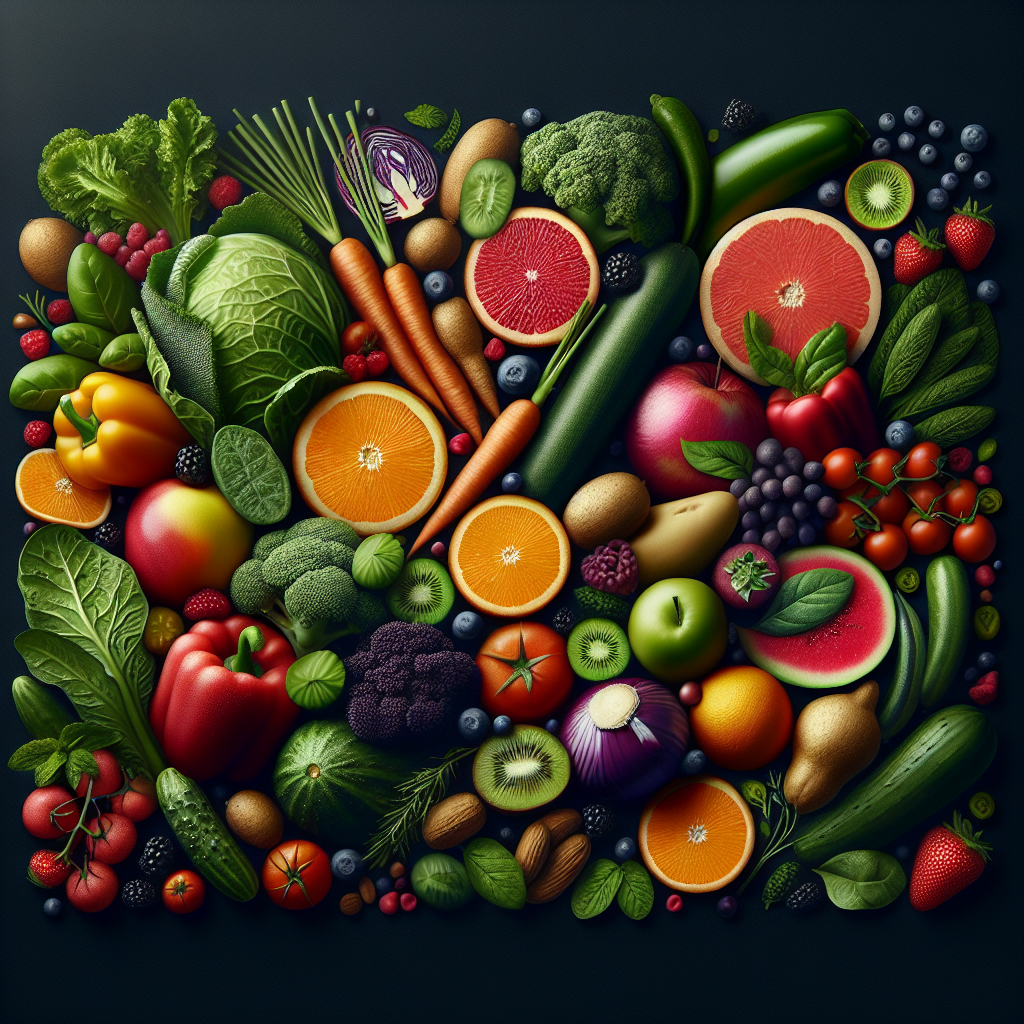Imagine a world where every bite you take contributes to your overall well-being. A world where food not only satisfies your taste buds but also nourishes your body with essential nutrients. In this article, we explore the undeniable benefits of whole foods over processed foods, highlighting how making the simple switch to whole foods can transform your health and happiness. Prepare to be empowered to make more informed choices about the food you consume as we unravel the reasons why whole foods trump processed foods every single time.

The Definition and Characteristics of Whole Foods
What are Whole Foods?
Whole foods refer to natural, unprocessed or minimally processed foods that are free from additives, preservatives, and artificial substances. They are foods that are close to their original form, just as nature intended. Whole foods include fruits, vegetables, whole grains, nuts, seeds, legumes, lean meats, and fish, among others.
Key Characteristics of Whole Foods
Whole foods are characterized by their nutrient density, meaning they contain a high concentration of essential vitamins, minerals, and antioxidants. They are also rich in fiber, which promotes digestive health and helps regulate blood sugar levels. Whole foods are typically low in sodium, unhealthy fats, and added sugars, making them a healthier option for overall wellness. These foods are also free from chemical additives and artificial flavors, making them a more natural choice for those seeking a clean and wholesome diet.
The Definition and Characteristics of Processed Foods
What are Processed Foods?
Processed foods are those that have undergone significant alterations from their original state. They often involve the addition of additives, preservatives, and artificial flavorings to enhance taste, texture, and shelf life. Examples of processed foods include packaged snacks, ready-to-eat meals, canned goods, sugary cereals, and processed meats.
Key Characteristics of Processed Foods
Processed foods are characterized by their high levels of added sugars, unhealthy fats, and sodium, all of which can have a detrimental impact on health when consumed in excess. These foods are often stripped of their natural nutrients during processing and may contain artificial additives and chemicals. They are also typically low in fiber, which can lead to digestive issues and have a negative effect on overall health.
Nutritional Value: Whole Foods vs Processed Foods
Variety of Nutrients in Whole Foods
Whole foods offer a wide variety of essential nutrients that are vital for our well-being. Fruits and vegetables are packed with vitamins, minerals, and antioxidants that support our immune system, improve heart health, and reduce the risk of chronic diseases. Whole grains provide fiber, B vitamins, and minerals, while lean meats and fish offer high-quality protein and essential fatty acids.
Nutritional Loss in Processed Foods
Processed foods often undergo cooking, refining, and packaging processes that can lead to a significant loss of essential nutrients. This loss is particularly noticeable with vitamins and minerals, as they are sensitive to heat and air exposure. Additionally, the high levels of added sugars and unhealthy fats in processed foods can outweigh any potential nutritional benefits, contributing to negative health effects.
Importance of Fiber in Whole Foods
Whole foods are rich in dietary fiber, which plays a crucial role in maintaining a healthy digestive system. Fiber helps to regulate bowel movements, prevent constipation, and keep our gut bacteria in balance. It also helps to control blood sugar levels, lower cholesterol, and promote healthy weight management. Processed foods, on the other hand, are often devoid of fiber due to the refining and manufacturing processes they undergo.
Excessive Added Sugars and Sodium in Processed Foods
Processed foods are notorious for their high levels of added sugars and sodium. Excessive consumption of added sugars can contribute to weight gain, obesity, and an increased risk of chronic diseases such as diabetes and heart disease. Similarly, excessive sodium intake can lead to high blood pressure and increase the risk of cardiovascular issues. Whole foods, on the other hand, offer natural sugars and minimal sodium content, making them a healthier choice for long-term well-being.
Health Benefits: Whole Foods vs Processed Foods
Impact of Whole Foods on Overall Health
Incorporating whole foods into your diet can have a significant positive impact on your overall health. The abundance of essential nutrients and antioxidants found in whole foods helps to strengthen the immune system, reduce inflammation, and promote optimal bodily functions. Whole foods also tend to be lower in calories and higher in fiber, making them more satiating and beneficial for weight management.
The Role of Whole Foods in Disease Prevention
Whole foods have been shown to play a critical role in preventing chronic diseases. Diets rich in fruits, vegetables, whole grains, and lean proteins have been associated with a reduced risk of conditions such as heart disease, stroke, type 2 diabetes, and certain types of cancer. The natural phytochemicals and antioxidants found in whole foods help to combat oxidative stress and inflammation, both of which are underlying factors in the development of these diseases.
Negative Health Effects of Processed Foods
While processed foods may be convenient and tasty, they can have detrimental effects on our health. The high levels of added sugars, unhealthy fats, and sodium in these foods contribute to weight gain, obesity, diabetes, heart disease, and other chronic conditions. Processed foods are often calorie-dense but nutrient-poor, leading to overconsumption and a lack of essential vitamins and minerals. Regular consumption of these foods has been linked to an increased risk of inflammation, digestive issues, and poor overall health.

Processing Methods and their Impact on Food
Mechanical Processing vs Chemical Processing
Mechanical processing involves physical processes such as chopping, grinding, or pulping to alter the texture or form of food. This type of processing is often used for fruits, vegetables, and grains. On the other hand, chemical processing involves the use of additives, preservatives, and artificial substances to extend shelf life, enhance taste, or improve appearance. Chemical processing is commonly used in the production of packaged snacks, frozen meals, and processed meats.
Effects of Processing on Nutritional Content
Processing methods, particularly chemical processing, can significantly impact the nutritional content of food. Heat treatment and exposure to air during processing can lead to the degradation of vitamins and minerals present in the raw ingredients. Additionally, the use of chemical additives can further strip the food of its natural nutrients. While mechanical processing can affect the texture and structure of food, it generally has a lesser impact on nutritional value compared to chemical processing.
Chemical Additives in Processed Foods
Processed foods often contain a variety of chemical additives, including artificial sweeteners, preservatives, flavor enhancers, and food colorings. While these additives are deemed safe by regulatory authorities, there is ongoing debate about their long-term effects on human health. Some studies suggest that certain additives may contribute to allergies, hyperactivity in children, and other health issues. By choosing whole foods, you can avoid the potential risks associated with consuming these chemical additives.
Environmental Considerations: Whole Foods vs Processed Foods
Impact of Whole Foods on the Environment
Choosing whole foods can have a positive impact on the environment. Whole foods, particularly those that are locally sourced and organic, often require fewer resources for production and transportation compared to processed foods. These foods have a smaller carbon footprint and contribute less to greenhouse gas emissions. By supporting local farmers and choosing seasonal produce, you can reduce the overall environmental impact of your diet.
Sustainability Issues with Processed Foods
Processed foods, particularly those that are highly processed and packaged, often contribute to environmental sustainability issues. The production and packaging of processed foods require significant amounts of energy, water, and resources. Additionally, the transportation of these foods over long distances contributes to carbon emissions and pollution. By reducing our consumption of processed foods and opting for whole foods, we can play a part in promoting a more sustainable food system.
Cost Comparison: Whole Foods vs Processed Foods
Affordability of Whole Foods
There is a common misconception that whole foods are prohibitively expensive compared to processed foods. While certain organic or specialty foods may come with a higher price tag, many whole foods are actually quite affordable. Shopping for whole foods that are in season and locally sourced can often be more cost-effective. Additionally, planning and preparing meals with whole ingredients can be more budget-friendly in the long run, as it reduces the need for expensive processed products.
Long-Term Cost of Consuming Processed Foods
While processed foods may seem more affordable in the short term, the long-term cost of consuming these foods can be significant. A diet high in processed foods is associated with an increased risk of chronic diseases such as obesity, diabetes, and heart disease. These conditions often come with hefty medical bills and long-term healthcare costs. Investing in whole foods and prioritizing your health now can save you money down the line.
Tips for Incorporating More Whole Foods into Your Diet
Meal Planning with Whole Foods
Meal planning is an effective strategy for incorporating more whole foods into your diet. Set aside some time each week to plan your meals, taking into account the whole foods you want to include. Create a shopping list based on your planned meals and stick to it when you go grocery shopping. Having a plan in place ensures that you have the necessary ingredients on hand to prepare nutritious and satisfying meals using whole foods.
Making Homemade Versions of Processed Foods
A great way to reduce your consumption of processed foods is by making homemade versions of your favorite processed snacks or meals. Experiment with recipes and try recreating healthier versions of processed foods at home using wholesome ingredients. For example, you can make your own granola bars using nuts, seeds, and natural sweeteners, or prepare homemade pizza using whole grain flour and fresh toppings. Not only will you have control over the ingredients used, but you can also customize the flavors to suit your preferences.
Choosing Locally Sourced Whole Foods
Supporting local farmers and choosing locally sourced whole foods is not only beneficial for the environment but also for your health. Locally sourced foods are often fresher and contain higher nutrient levels compared to foods that have been transported long distances. Look for farmers’ markets or community-supported agriculture programs in your area to find locally produced whole foods. By purchasing directly from the source, you can enjoy the benefits of fresh and nutrient-rich produce while supporting your local community.
Consumer Perception and Marketing Influences
Consumer Perception of Whole Foods vs Processed Foods
Consumer perception plays a crucial role in the choices we make when it comes to food. Whole foods are often perceived as healthier and more natural compared to processed foods, and rightly so. However, the convenience and advertising tactics surrounding processed foods can sometimes overshadow their potential negative effects on health. It is important to educate ourselves and make informed choices based on the nutritional value and long-term health benefits of whole foods.
Marketing Tactics and Misleading Claims
The food industry is known for its marketing tactics and misleading claims on packaging. Terms such as “all-natural,” “low-fat,” or “sugar-free” may sound appealing, but they can be misleading and mask the true nutritional content of processed foods. It is essential to read food labels carefully and understand the ingredients list and nutritional information. By being knowledgeable consumers, we can make choices that align with our health goals and prioritize whole foods over processed alternatives.
Conclusion
Whole foods are the foundation of a healthy diet, offering a wide array of nutrients and health benefits. Processed foods, on the other hand, often lack these essential nutrients and come with potential negative health effects. By choosing whole foods over processed options, you can improve your overall health, reduce the risk of chronic diseases, and contribute to a more sustainable food system. Incorporating more whole foods into your diet doesn’t have to be complicated. With a little planning, creativity, and a focus on choosing quality ingredients, you can enjoy the benefits of whole foods while nourishing your body. So, why not make the shift and embrace whole foods as a key part of your lifestyle for a healthier and happier you?

